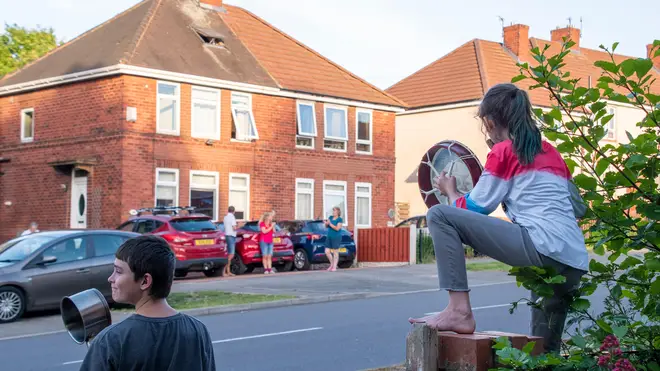
Iain Dale 7pm - 10pm
2 September 2021, 06:11 | Updated: 2 September 2021, 06:14

Shelagh Fogarty's epic rant on noisy neighbours and their impact
Noisy neighbour complaints rose by more than a quarter during Covid lockdowns as people were cooped up indoors for longer, research suggests.
Councils across the country received roughly 1,000 noise complaints per day between 2020 and 2021, according to a study by Churchill Home Insurance.
From April 2020, at the peak of the first lockdown, to March 2021, when restrictions in the third lockdown began to ease, almost 370,000 noise complaints were made - a 28 per cent increase on the previous year.
Nearly nine in 10 local authorities reported a rise, with the West Midlands town of Dudley recording the most - 26,000 - of any council.
London had six local authorities in the top 10, with the Royal Borough of Kensington and Chelsea receiving the largest number of noisy neighbour complaints per person - 99 for every 1,000 inhabitants.
Watch: James O'Brien's perfectly-timed call when discussing noisy neighbours
Watch: James' caller with noisy neighbours thrilled as listener helps stop drilling

Woman gets revenge on noisy neighbours by throwing crumbs on their caravan for the seagulls early in the morning
The firm obtained the data by sending Freedom of Information (FoI) requests to all councils in England, Scotland, Wales and Northern Ireland - and getting back usable answers from seven in 10 of them. It also commissioned polling by Opinium of 2,000 adults between 23 and 27 July.
Around a third (32 per cent) of respondents said their mental health had been negatively affected by noise from neighbours.
The worst type of disturbance was neighbours playing music (34 per cent), followed by noise from children or garden noise (30 per cent), parties (29 per cent) and coming and going at anti-social hours (24 per cent).
Only 11 per cent who said they had been affected by noisy neighbours said they had reported it to their local council.
This suggests the true number of noise-related issues could be much higher, running into millions each year, Churchill Home Insurance said.
In 29 per cent of cases, the person affected spoke to their neighbour but the majority said they were unsuccessful in stopping the noise. Others contacted the neighbour's landlord (16 per cent) or reported them to the police (14 per cent).
Read more: ‘Racial hate’ police record as man ‘whistles Bob The Builder song’ at neighbour
Read more: BMW ad banned after listener complains about 'irresponsible revving' noise

Steven Williams, head of Churchill Home Insurance, said: "The pandemic has seen us confined to our homes which means we've probably all become very aware of noises around us.
"As we go into more of a 'new normal', many of us will carry on working from home, at least part of the time, so noisy neighbours will continue to be really disruptive.
"It may be the case that neighbours don't realise they are being noisy so the first step should always be speaking to them and explaining the problem.
"If that doesn't work and they carry on, then keep a record of the type of noise and time of day, and speak to your local council about raising a potential noise complaint."
Psychologist Donna Dawson said the rise in complaints was understandable given the upheaval in people's routines.

She said: "Even small changes in sound can cause increased anxiety and stress for many people, especially if it disrupts home life and makes it difficult to relax, work or look after family."
She recommends that people speak to their neighbours, but not when they are feeling anxious or angry.
Cllr Nesil Caliskan, chair of the Local Government Association's Stronger and Safer Communities Board, said: "With many people living in high density, urban areas, complaints about noise nuisance are common.
"Councils are doing what they can to respond to noise complaints in communities, and to tackle persistent behaviour that makes peoples' lives a misery.
"Dealing with increased reporting of noise nuisance has added to the pressure on council environmental health teams that are already overstretched. The spending review needs to commit to additional investment in regulatory services to ensure councils are able to effectively respond to issues of importance to their communities."